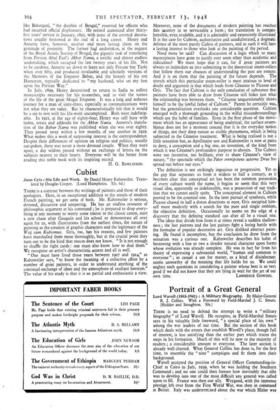In Victorian Bengal
India Called Them. By Lord Beveridge. (Allen and Unwin. 18s.)
THE life story of Henry and Annette Beveridge, so movingly told by their son, is typical of the vanished generation of British civil servants in Victorian India, with its deadly monotony, its discomforts and separations—a tale of servants, snakes and sickness. • Henry Beveridge, son of a brilliant but erratic writer, was one of the earliest of the "competition wallahs," and passed in 1857. Eighteen years later he married en secondes noces Miss Annette Akroyd, a lady of advanced opinions and five years his junior, who had come out to India to start a school for Hindu girls in response to the impas- sioned appeal of Keshub Chtmder Sen, the Bengali social reformer. One cannot help feeling that they were both misfits in a land where their brilliant literary talents were so little appreciated. Annette was disgusted at the way in which the Hindus treated their women ; Henry was exasperated by the Bengalis' love of talk instead of action. But this did not prevent him from being an ardent champion of Indian rights. Like his father, he believed that the object of British rule was to enable India to govern herself. He openly criticised certain aspects of the administration especially the holding of exam-
inations for the Civil Service under conditions which virtually debarred Indians from competing. What was worse, he warmly supported the Ilbert Bill, which authorised Indian judges to try Europeans. This measure met with furious opposition from the unofficial element, mainly planters and business-men, in Bengal, and from many officials of the older school, including Henry's own Lieutenant-Governor, Sir Rivers Thompson.
This was fatal to Henry's official career. Unlike his younger contemporary, Henry Cotton, Ile failed to ride out the storm. He spent the rest of his service as a district judge in desolate backwaters like l3akarganj, "the dustbin of Bengal," reserved for officers who had incurred official displeasure. He retired unnoticed after thirty- five years' service in January, 1893, with none of the coveted decora- tions usually bestowed at the end of a long career. Henry and Annette have, however, another and more lasting claim on the gratitude of posterity. The former hail undertaken, at the request of the Royal Asiatic Society of Bengal, the gigantic task of translating from Persian Abul Fazl's Akbar Nama, a terrific and almost endless undertaking, which occupied the last twenty years of his life. Not to be outdone, Annette sat down to learn not only Persian but Turki when over fifty, and produced invaluable, and scholarly versions of the Memoirs of the Emperor Babar, and the history of his son Humayun, typically dedicated to "my husband, who set my feet upon the Persian Way."
In July, 1899, Henry determined to return to India to collect manuscripts necessary for his researches, and to visit the scenes of the life of the great Mogul Emperor. It was a long and arduous journey for a man of sixty-three, especially as communications were not what they are today. But he characteristically felt that it would be a sin to rest with his life-work uncompleted. Both were indefatig- able. In 1921, at the age of eighty-four, Henry was still busy with index, errata and addenda for the Akbar Nama. Annette's transla- tion of the Babur Nama was published when she was over eighty. They passed away within a few months of one another in 1929. What makes this a work of surpassing interest is the correspondence. Despite their differences of opinion on religion and politics, usually outspoken, there was never a more devoted couple. When they were apart, a day seldom passed without an exchange of letters on the subjects nearest to their hearts. Everyone will be the better from reading this noble book with its inspiring record.
H. G. RAWLINSON.



































 Previous page
Previous page